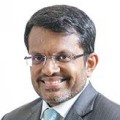Monday, Apr 18, 2022 | 02:30 PM - 03:30 PM
Location: Meeting Halls A&B, HQ1-3-430A&B

Digital money is reaching a crossroad, where today’s policy and regulatory choices will affect the evolution of the monetary and payments landscape. Should future money in circulation be mostly publicly issued in the form of central bank digital currency (CBDC) or privately issued, or is there space for a healthy balance of the two? How do trends in “private” crypto assets affect plans to develop CBDC? This seminar will explore these and other questions with high-level policymakers from around the world.
 |
Kristalina Georgieva Managing Director, IMF |
Kristalina Georgieva is the Managing Director of the International Monetary Fund (IMF). She is the first person from an emerging market economy to lead the IMF since its inception in 1944. Before joining the Fund, Ms. Georgieva was Chief Executive Officer of the World Bank and also served as Interim President for a time. Previously, she served at the European Commission as Vice President for Budget and Human Resources – and as Commissioner for International Cooperation, Humanitarian Aid and Crisis Response. She was named “European of the Year” and “Commissioner of the Year” by European Voice for her leadership in the European Union’s humanitarian response to crises.
 |
Roberto Campos Neto President of the Central Bank of Brazil |
Roberto Campos Neto is the President of the Central Bank of Brazil (BCB) since February 2019. A UCLA-trained economist, Mr. Campos Neto has extensive experience in the financial sector and has assumed various leadership roles over 20 years at Santander bank, including most recently as head of Global Treasury for the Americas. He was named Central Banker of the Year 2021 by The Banker in recognition of the BCB’s effective response to the pandemic. Under Mr. Campos Neto’s leadership, Brazil’s central bank advanced an important agenda of digitalization in the financial sector, including the launch of the highly successful PIX payment system in 2020 and the open banking initiative in 2021, and was among the first central banks to quantify social, environmental, and climate-related risks in the financial sector.
 |
Ravi Menon Managing Director of the Monetary Authority of Singapore |
Ravi Menon was appointed Managing Director of the Monetary Authority of Singapore (MAS) in 2011. In his sixteen years at MAS, he has been involved in monetary policy, macroeconomic analysis, banking regulation and liberalization, and organizational development. He has also served as Permanent Secretary at the Ministry of Trade & Industry, and Deputy Secretary at the Ministry of Finance and member of the Secretariat to the Financial Stability Forum, BIS. Mr. Menon holds degrees in Economics from the National University of Singapore and Public Administration from Harvard University.
 |
Nirmala Sitharaman Minister of Finance, India |
Nirmala Sitharaman was appointed Minister of Finance in late May 2019, at the beginning of the Bharatiya Janata Party (BJP) government’s second term in office, succeeding Arun Jaitley. She previously held the post of Defense Minister (2017-19) and is the country’s second female occupant of either of these positions (in both cases, Indira Gandhi was the first). Minister Sitharaman holds a Master of Arts in economics from Jawaharlal Nehru University (Delhi).
 |
Gillian Tett Financial Times |
Gillian Tett is chair of the editorial board and editor-at-large, US of the Financial Times. She writes weekly columns, covering a range of economic, financial, political and social issues. In 2014, she was named Columnist of the Year in the British Press Awards and was the first recipient of the Royal Anthropological Institute Marsh Award. In June 2009 her book Fool’s Gold won Financial Book of the Year at the inaugural Spear’s Book Awards. Tett’s past roles at the FT have included US managing editor, assistant editor, capital markets editor, deputy editor of the Lex column, Tokyo bureau chief, and a reporter in Russia and Brussels.
Digital money is reaching a crossroad. The seminar discussed the prospects of digital public and private money and policymakers’ considerations in supporting and regulating their development.
Key Points:
Quotes:
“We are at the crossroads around how fast, how far, and in what proportions, but I see this as a one-way street in which digital money is going to play a bigger role.” Kristalina Georgieva
“What people need is something [as money] that has five characteristics: fast, cheap, secure, transparent, and open.” Roberto Campos Neto
“We should look at the underlying activity, and the nature and quality of the crypto assets, to determine specific risks they pose and the right-size regulation to address those risks.” Ravi Menon
“Regulation using technology will have to be so adaptive and nimble that it has to not be behind the curve, but be sure that is it on the top of it.” Nirmala Sitharaman
Contributor: Bo Zhao